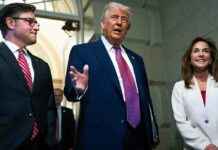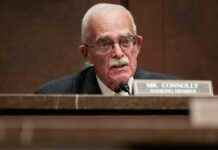Conservatives Celebrate Victory in Berlin, Challenges Loom Ahead
In a thrilling conclusion to the German federal election, the conservative alliance comprised of the Christian Democratic Union (CDU) and the Christian Social Union (CSU) emerged victorious, signaling a new era in German politics. The alliance secured 28.6% of the votes, overshadowing the far-right Alternative for Germany (AfD) and the center-left Social Democratic Party (SPD). This triumph paves the way for Friedrich Merz, the CDU-CSU candidate, to assume the role of Germany’s next chancellor, succeeding Olaf Scholz from the SPD.
Merz expressed gratitude for the success of the CDU-CSU, attributing their victory to a well-coordinated effort and meticulous preparation. Their strategic campaigning and united front propelled them to victory, marking the end of a tumultuous period in German politics.
A New Chapter in German Politics
Following the election results, the spotlight now shifts to the formation of a coalition government, a critical process that will shape the future of Germany. While the CDU-CSU and the SPD are the frontrunners for a two-party coalition, there is also speculation about the inclusion of the Greens in a three-party alliance. Friedrich Merz has firmly rejected any collaboration with the AfD, underscoring his commitment to upholding democratic values and principles.
David McAllister, a prominent CDU politician and member of the European Parliament, expressed confidence in Merz’s leadership, highlighting his integrity and vision for Germany. As the country looks towards a new administration, the focus remains on restoring confidence, fostering economic growth, and addressing pressing challenges.
Charting a Path Forward
Despite the celebratory mood following the election, the incoming government faces a host of formidable challenges that demand swift and decisive action. Germany’s economy, heavily reliant on exports and manufacturing, is grappling with sluggish growth and structural vulnerabilities. The rise of populist movements like the AfD underscores the urgency of addressing issues related to immigration, integration, and national identity.
Moreover, Germany’s role in European geopolitics is under scrutiny, particularly in light of the conflict in Ukraine and the specter of trade tensions with the United States. The need for fiscal reform and strategic policy decisions looms large, as the country navigates a complex landscape of economic uncertainty and political fragmentation.
Expert Insights and Projections
Economists and analysts are closely monitoring the implications of the election results on Germany’s economic trajectory and policy agenda. The debate over the “debt brake,” a contentious fiscal policy enshrined in Germany’s constitution, has taken center stage, with divergent views on its efficacy and impact on growth.
Holger Schmieding, chief economist at Berenberg Bank, emphasized the importance of a new government in ending the prolonged political stalemate and advancing pro-growth reforms. He underscored the potential for a coalition between the CDU/CSU and the SPD to drive economic revitalization and regulatory reforms.
Looking ahead, the possibility of constitutional amendments and fiscal policy adjustments hinges on the alignment of political forces and the willingness to compromise. While challenges persist, there is cautious optimism that the new coalition government will usher in a period of stability and progress for Germany.
In conclusion, the conservative triumph in Berlin marks a significant milestone in German politics, setting the stage for a new chapter of governance and reform. As the country navigates a complex and uncertain landscape, the resilience and determination of its leaders will be tested, shaping the future of Europe’s largest economy.

























